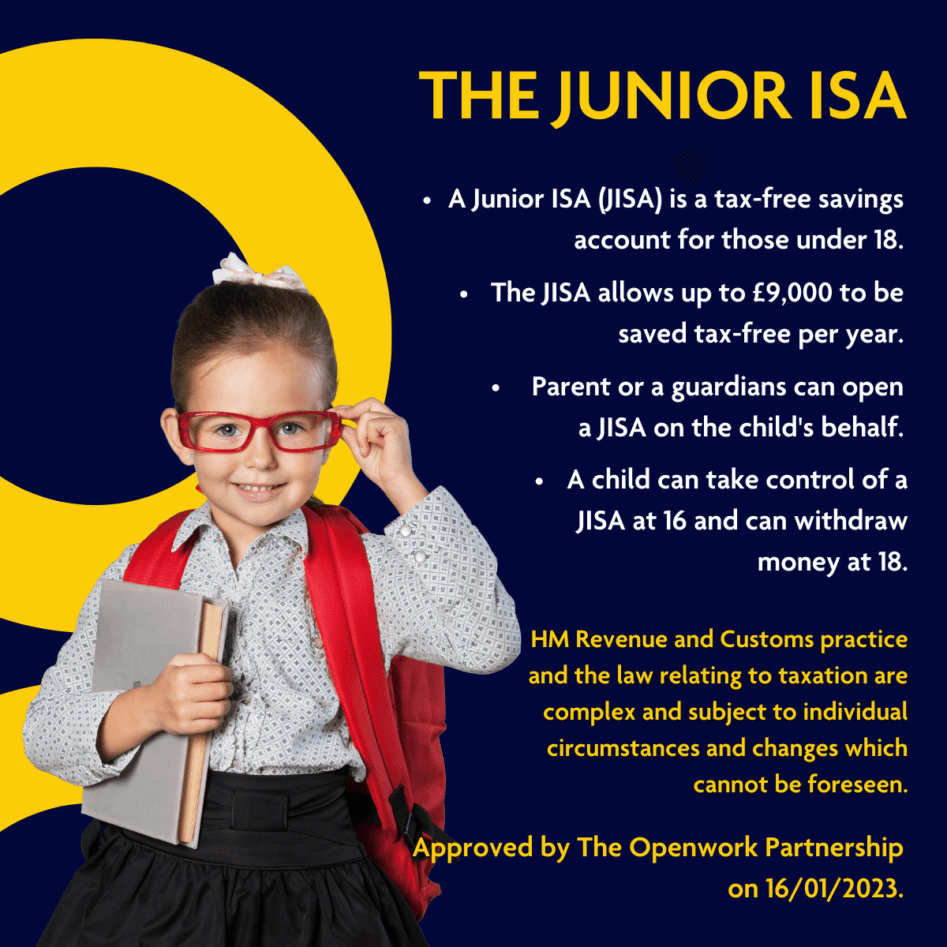


Junior ISAs
In the 2022 Autumn Budget, it was revealed that the Junior ISA (JISA) spending limits would remain at £9,000 for the 2023/2024 tax year. The JISA limit was last changed in early 2020, when it was doubled from £4,500 to its current level.
JISA and CTFs both benefit
JISAs replaced Child Trust Funds (CTF) in 2011, but those who still hold CTF will continue to benefit from the increased allowance. Both JISA and CTF are a tax efficient way to build up savings for a child. It is not possible to have both a JISA and a CTF.
Savings for children
A junior ISA can be opened for any child under 18 living in the UK and the money can be held in cash and/or invested in stocks and shares. Once the person who has parental responsibility for a child has opened the account, anyone can contribute to it. The child can manage the account from age 16 and at age 18 they can withdraw the money if they want, when the account otherwise becomes a normal cash or stocks and shares Individual Savings Account (ISA). Alternatively, they can keep saving into it as a standard ISA.
The tax benefits for JISAs and CTFs are the same as for an adult ISA. So, there is no Capital Gains Tax and no tax on income.
Investing for their future
Following the Budget, it was reported: ‘By saving towards their future, families can give children a significant financial asset when they reach adulthood – helping them into further education, training, or work.
Junior ISAs and Child Trust Funds are tax-advantaged accounts for children, designed to encourage a long-term savings habit.’
Two principles which apply to many aspects of financial planning are particularly relevant when planning for your child’s financial future:
- The longer the timescale, the more scope there is for your investments to grow
- Taking expert advice can help you avoid potential pitfalls
The potential of a JISA
It is estimated that if £9,000 was invested every year from birth and assuming a net 2% return, which is obviously by no means guaranteed, the JISA would be worth around £194,000 at age 18. Saving such a large amount is obviously out of the question for most people, but whatever amount you can afford to save for your child’s future, a JISA can be a great choice.
HM Revenue and Customs practice and the law relating to taxation are complex and subject to individual circumstances and changes which cannot be foreseen.
An ISA is a medium to long term investment, which aims to increase the value of the money you invest for growth or income or both. The value of your investments and any income from them can fall as well as rise. You may not get back the amount you invested.
Tax concessions are not guaranteed and may change in the future. Tax free means the investor pays no tax.
Approved by The Openwork Partnership on 25/01/2023
Key takeaways:
- The JISA allowance will remain at £9,000 for the 2023/2024 tax year.
- Junior ISAs are long-term, tax-free savings accounts for children.
- JISAs replaced Child Trust Funds (CTFs) in 2011.
- Both benefit from the increased allowance of £9,000 per tax year.
- JISAs can be opened for any child under 18 living in the UK.
- Once the person who has parental responsibility for a child has opened the account, anyone can contribute to it.
- The child can manage the account from age 16 and at age 18 they can withdraw the money.
- There is no Capital Gains Tax and no tax on income.
- The ISA allowance will remain at £20,000 for 2023-2024 tax year.
- HM Revenue and Customs practice and the law relating to taxation are complex and subject to individual circumstances and changes which cannot be foreseen.
- An ISA is a medium to long term investment, which aims to increase the value of the money you invest for growth or income or both.
The value of your investments and any income from them can fall as well as rise. You may not get back the amount you invested.
Tax concessions are not guaranteed and may change in the future. Tax free means the investor pays no tax.




